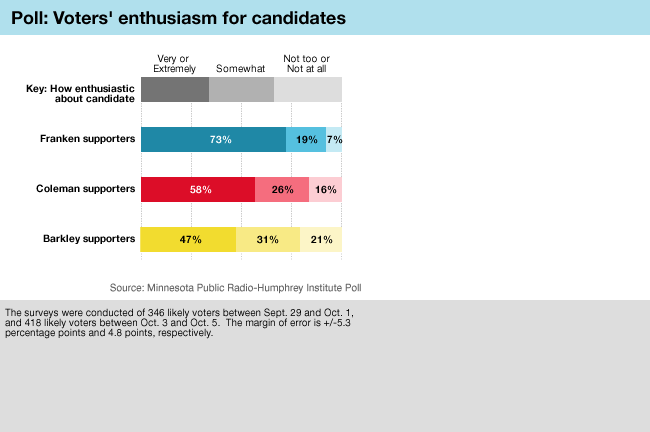Poll: Economy costs Coleman lead in Senate race
Go Deeper.
Create an account or log in to save stories.
Like this?
Thanks for liking this story! We have added it to a list of your favorite stories.

Pollsters will tell you timing is everything in their business. They say, while their surveys can indicate trends, individual polls are nothing more than snapshots of voter sentiment at the time the questions are asked.
Minnesota Public Radio News and the Humphrey Institute timed their latest polling with the presidential race in mind, in hopes of gauging the impact of the vice presidential debate on Minnesota voters.

Researchers contacted 346 likely voters three days before that debate between Republican Sarah Palin and Democrat Joe Biden. They conducted a second survey of 418 likely voters three days after last Thursday's debate.
The margin of error for both polls was about 5 percent.
Turn Up Your Support
MPR News helps you turn down the noise and build shared understanding. Turn up your support for this public resource and keep trusted journalism accessible to all.
Poll director Lawrence Jacobs said the two polls also happened to come before and after congressional approval of the Wall Street bailout.
Jacobs said it's in that context the U.S. Senate race numbers are striking. DFLer Al Franken said he would have voted against the bailout. Republican Sen. Norm Coleman supported it. Independence Party candidate Dean Barkley says he would have voted for it too.
A nearly double digit pre-bailout lead for Coleman in the first poll transformed into 4 point lead for Franken in the second poll.

"Norm Coleman's 9-point lead over Al Franken essentially disappears in the wake of the financial bailout that Congress passed," Jacobs said. "He is really suffering the consequences."
While the poll shows Franken has overtaken Coleman, Franken's lead is within the margin of error -- leaving Coleman and Franken in a statistical dead heat.
Jacobs says prior to the bailout, 80 percent of those polled said they thought the country was heading in the wrong direction. After the bailout, that number had risen to 87 percent. And Franken gained significant support from those who think the country is heading in the wrong direction.
From the first to second poll, Independence Party candidate Dean Barkley's support stayed at 14 percent. Jacobs says that could be good news for Franken.
"Barkley does not appear to be benefitting from this backlash as the outsider," he said. "It could well be that he is plateauing in his support, and that the kind of angry disconnected voters who were signing on with Dean Barkley maybe are just about at the ceiling in Minnesota."
But Barkley's 14 percent is 6 points higher than his showing in the last MPR News/Humphrey Institute poll in August.
Jacobs said with such a close contest, turning out supporters will be critical to the candidates. He said an analysis of combined data from the two polls shows Franken's supporters are much more excited about the election than are Coleman's.
"About three-quarters of the Franken supporters are enthusiastic, compared to just over half of Coleman's," Jacobs said. "This could be a leading indicator that the turnout come Election Day will be much higher for Al Franken. That could be bad news for Sen. Coleman if these numbers continue."
According to the polls, less than half of Barkley supporters are very or extremely enthusiastic.
There is also troubling news for Franken in the polls. Franken has the support of just 63 percent of Democrats, compared to Coleman's 80 percent support among Republicans.
Most Minnesota voters also believe Franken is too liberal.
The second of the two polls shows Democratic presidential candidate Barack Obama has significantly more support among likely Minnesota voters than Franken, even though the two will be on the same ticket.
According to the two polls, likely Minnesota voters by a more than two-to-one margin blame Coleman more than Franken for the negative tone of the ads in the Senate race. And four in 10 told pollsters they're less likely to vote for the negative candidate.




